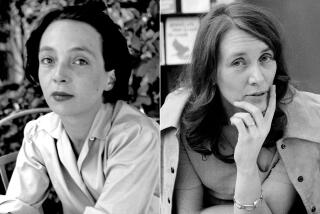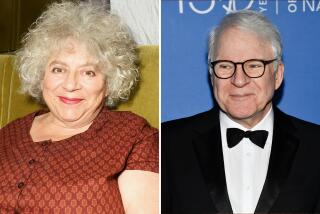Leavable Loves : MY SECRET HISTORY <i> by Paul Theroux (G. P. Putnam’s Sons: $21.95; 512 pp.) </i>
Paul Theroux has written a shelf full of books--25 in all--and unlike Hemingway and Steinbeck, his writing has improved, not diminished with age, as he lets his imagination replay the many adventures of his own wide-ranging life. The result in “My Secret History” is a wonderful book--no doubt spiced with some elements of autobiography--about the haunting guilt of a young man born Catholic to a family of modest means in suburban Boston as he grows into adulthood and sets off in search of sexual adventure.
Theroux’s main character, Andrew Parent, is introduced as an altar boy in his early teens in an era when sticking a hand under a girl’s bra was a sin akin, almost, to derailing a train. In fact, at this stage, everything seems to be sinful--even befriending a priest who drinks too much--and the boy has to develop a fine skill for lying, in order to avoid the wrath that adults shower on offending teen-agers.
Then, in the summer before college, Parent becomes old enough to do “it”--furtively, in a musty room, with a girl two years his senior. (In addition, he develops some sense of proportion--as he fends off a bored, rich 50-year-old matron who works hard at trying to seduce him.) The novel also recalls the horrors of late pubescence as the boy “knocks up” his first love, and the two of them begin canvassing quacks to perform what was then an illegal, life-threatening medical procedure.
The story leaps forward to Parent’s young adulthood. After college, he goes off to Africa as a Peace Corps volunteer, a victim of sorts of his own animal nature. Thus, he not only wants sex three times a week--he wants a different woman for Friday, Saturday and Sunday. The young man’s hormones are so overwhelming, he doesn’t care that his partners can barely speak English or occasionally give him a low-grade venereal disease. Parent is transferred to Uganda, to run an adult studies institute, and there he meets an attractive British woman and falls deeply in love. She gets pregnant and they decide to marry--nipping in the bud her own career as a teacher. Up to this point, what carries the reader along is Theroux’s skill at drawing his characters: Parent is self-absorbed, naive, arrogant. His wife, Jenny, is more complex: giving without being tender; willing to sacrifice her ambitions for the good of their relationship, but still cool and disapproving. They return to England, where she supports the family with a low-level bank job.
Then the book takes on a new dimension, as Parent, on one of his world-circling excursions, suddenly becomes homesick and rushes home--only to discover that Jenny has begun an affair with a bank executive. Now he realizes she too has her own “secret life,” and the knowledge that he has been cuckolded drives him to the edge of madness.
To this point, whatever the book lacks in plot it makes up for in Theroux’s ability to evoke the rest of the world. Theroux is a master, for instance, at describing the strange netherworld of Europeans in post-colonial Africa. Theirs is a ridiculous existence. Thus Parent’s Peace Corps roommate in Malawi (where Theroux taught from 1963-65) tries to avoid intimate contact with Africans and becomes intent on building an outdoor toilet nobody particularly needs. And in Uganda (where Theroux taught at Makere University from 1965-68), Parent quickly adopts the easy, useless pace of an office-bound bwana:
“The parrot woke me with its squawks when Jackson uncovered its cage. Then I had breakfast--tea and papaya, and now and then Jackson fried me an egg. I read the Uganda Argus in my office, and at eleven went to the Senior Common Room for a coffee with the other faculty members. Back to my office, to sit and look at the herons, until lunchtime, usually at The Hindoo Lodge, with Neogy and Desai. If we had a curry we always went to the panwallah afterwards, and I walked home with a wedge of pan in my mouth, and spitting betel juice along Kampala Road. . . . And then teatime flowed into sundowner time at the Staff Club and I drank beer--often with Rashida--until I was drunk.”
As the narrative reaches its final phase, Theroux is able to play man and wife against one another, adding irony upon irony, as Parent becomes successful enough to maintain two homes, one in London and the other Hyannisport, and, in that ultimate indulgence, to take a mistress. The last chapter of the book is entitled “Two of Everything.” Parent now has two sexual partners, each offering her own set of pleasures. But neither is quite satisfied as he hovers between them and what has become his other “secret” intellectual life of writing, introspection and fantasy.
Andy Parent can’t decide between his two women, just as Macon Leary in “The Accidental Tourist” couldn’t make up his mind whether to go back to his ex-wife or on to his new girlfriend. Parent, like many today, can’t seem to focus and often disappoints those who depend on him. His flaws play in a minor key. But Theroux uses such failings and lack of inertia to give dimension to his characters, rendering life with the subtle colors and detail of an Andrew Wyeth painting. The fact that he does this successfully in a foreign setting only makes the journey that much more enjoyable.
The book is distinguished by its sense of place and honesty. Theroux’s gift for painting Third World characters--Indian shopwallahs and tourist guides, African functionaries and prostitutes--is equal to that of Graham Greene or Somerset Maugham. The narrative moves slowly--indeed, the first part of the book rambles at times and lacks the spareness or drama of his two best-known novels, “Half Moon Street” and “The Mosquito Coast.” But at 48, Theroux is of an age to enjoy the tiny nuances that separate people, and to delight in the ambivalence that plagues modern man.
More to Read
Sign up for our Book Club newsletter
Get the latest news, events and more from the Los Angeles Times Book Club, and help us get L.A. reading and talking.
You may occasionally receive promotional content from the Los Angeles Times.






